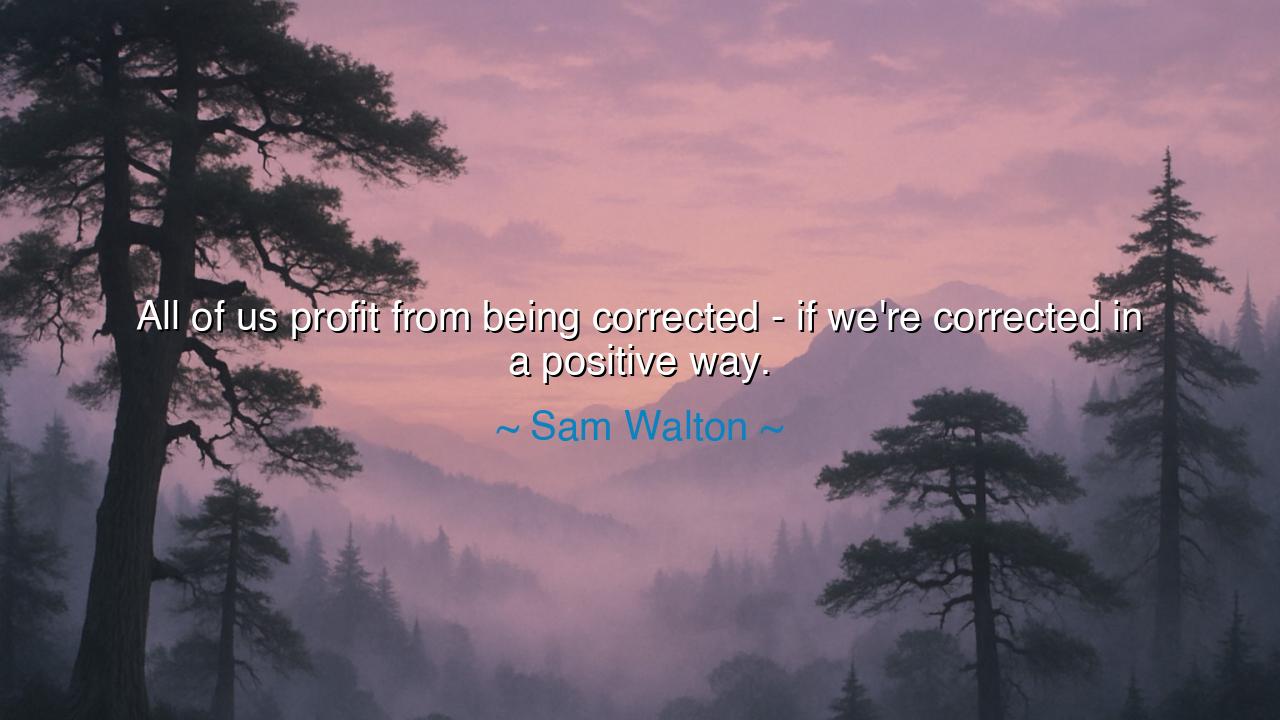
All of us profit from being corrected - if we're corrected in a






Hear the wisdom of Sam Walton, spoken not only as the founder of great markets but as a teacher of the human heart: “All of us profit from being corrected—if we’re corrected in a positive way.” These words are not about wealth alone, but about the treasure of growth, about the refining of the soul through guidance. For man is not born perfect; he stumbles, he errs, he falters. Yet if the hand that corrects him is gentle and filled with positive intent, the stumble becomes a stepping-stone, and the error becomes the seed of wisdom.
To profit here is not merely to gain silver or gold, but to gain strength, understanding, and new direction. The ancients often spoke of correction as the hammer that shapes the blade. Left untested, the blade grows brittle; struck with cruelty, it shatters; but struck with skill and purpose, it becomes sharp and enduring. So it is with the human spirit. We do not shrink under positive correction; we rise, sharpened and tempered by it.
Consider the tale of Alexander the Great and his tutor Aristotle. The young prince, filled with pride and the fire of youth, could have grown wild and untempered, had not Aristotle guided him with wisdom. Yet the philosopher did not humiliate or scorn him; instead, he corrected with vision, showing him that leadership must be guided by knowledge and balance. From this positive correction arose a leader who carried Greek thought to the edges of the known world. Without such guidance, his conquests may have been nothing but ruin.
But let us also remember the danger of correction wielded poorly. When rulers humiliate their soldiers, when masters shame their apprentices, when leaders scold with venom rather than with hope, they do not build strength—they crush it. History recalls many kings who silenced their advisors, rejecting correction out of pride, and thus marched blindly into ruin. Pride deaf to positive counsel is a sickness, and harsh correction without compassion is poison.
The meaning, then, is twofold. First, we must be humble enough to accept correction, to see in it not insult but opportunity. Second, those who guide must wield their power with care, offering correction not to belittle but to uplift, not to shame but to strengthen. When both humility and compassion meet, growth becomes inevitable.
The lesson for us is clear: let no one despise being corrected, for it is the forge of wisdom. When you are corrected, ask yourself: Is there truth here that I may learn from? And when you correct others, ask yourself: Does my guidance carry positive intent? Does it light the way forward rather than darken the spirit? In this exchange lies the true wealth of human progress.
Practical steps flow from this teaching. As a student, receive correction with gratitude, knowing it saves you from greater error ahead. As a leader, mentor, or parent, give correction wrapped in encouragement—say not only what was wrong, but what can be made right. Create environments where mistakes are seen as teachers, not as chains of shame. In this way, the cycle of positive correction becomes a river that nourishes all who drink from it.
So remember Sam Walton’s wisdom: “All of us profit from being corrected—if we’re corrected in a positive way.” To profit is to grow, and to grow is to live fully. Accept correction with humility, give correction with compassion, and you will not only prosper yourself, but also enrich the lives of all who walk beside you.






VANgo Van An
I feel inspired by this philosophy, but it makes me curious about practical applications. How do managers or educators ensure that their corrections are constructive and positively received? Are there frameworks or best practices for coaching, mentoring, or teaching that maximize the benefits of corrective feedback? Learning how to create an environment where corrections are welcomed rather than feared could be transformative for personal and professional growth.
TMTra My
This quote raises questions about self-awareness and receptivity. How can someone develop the mindset to accept corrections without taking offense, even if delivered with positive intent? Does emotional intelligence play a role in interpreting feedback constructively? Exploring how both the giver and receiver of corrections can cultivate mutual respect and understanding could provide insights into more effective communication and growth.
DTNguyen Duc Thinh
I’m intrigued by the idea that everyone benefits from correction if delivered positively. How do we balance honesty with tact, ensuring that feedback is truthful but also encouraging? Are there situations where tough criticism is necessary, and if so, how can it be framed positively? Understanding the nuances of feedback delivery could help people improve learning outcomes, team performance, and personal relationships.
CMNguyen Cong Minh
Reading this makes me consider how often correction is mishandled. Could repeated negative feedback actually diminish motivation, even if the content is valid? I’m curious about the psychological mechanisms that make positive corrections more effective—do they encourage reflection and growth, or is it about feeling respected and supported? Exploring strategies for giving and receiving corrections could offer practical guidance for both personal development and workplace dynamics.
TTTrang Thuy
This perspective is thought-provoking because it highlights the importance of the manner in which feedback is given. I wonder, though, what exactly defines a 'positive' correction—is it tone, intent, or constructive guidance? Are there cultural or personal factors that influence how people perceive corrections? I’d like a perspective on how to deliver feedback effectively so that it truly benefits the recipient, rather than causing defensiveness or resentment.